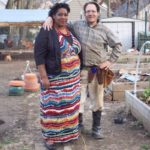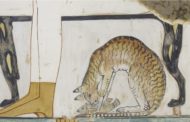THE AMOS FARM
You can take a horse to water, but you can’t make him less stupid.
Forced to choose between limiting population or trying to increase food production, we chose the latter and ended up with starvation, warfare, and tyranny. -Jared Diamond
 It was only in the last couple of years that I learned that the dental health of indigenous peoples precipitously dropped with the arrival of maize.
It was only in the last couple of years that I learned that the dental health of indigenous peoples precipitously dropped with the arrival of maize.
How could this be so? I thought, we were taught that corn was so important to them, that the transition from hunter-gathering to agricultural settlement was such an advancement in human history, how could it be otherwise? As always, you can never be too cynical…
Urban Agriculture. It’s hip, it’s cool, it’s the wave of the future. Take, for instance, Ron Finley. He bills himself as the “Gangsta Gardener” of South Central LA and his February 2013 TED Talk has over 3 million views, what’s old is new and urban agriculture is blossoming in those places blighted by the promise of capitalism, whether it’s South Central or Detroit. These under-resourced communities (unless you’re talking criminalization), disproportionately occupied by people of color and created in the process of suburbanization (a.k.a. white flight) are food deserts and havens of unhealthy, cheap, high calorie, high preservative processed food, what better idea than to create your own food security? As we all were taught:
Neolithic people needed protection from the weather and wild animals. A settled life provided greater security. Steady food supplies created healthier, growing populations. As the population increased, more workers became available. Those individuals could grow more crops. (6th Grade Social Studies Text)
That’s what we all were forced to regurgitate, that the agricultural revolution led to better health and more time for socially beneficial pursuits because people no longer had to aimlessly wander in search of food; they were healthier and they could settle down.
Full Stop.
What is “better”, what defines a better quality of life and does the fact that one way of doing things beats out another by definition mean that it’s better, or does “might make right?” Populations of hunter-gatherer societies rarely average more than 1 person every 10 square miles, an agricultural society can support a hundred-fold as many.
Did our ancestors become farmers because they wanted to, or because one person doesn’t stand a chance against 100, no matter what? We all learned about the “native Americans” and corn in school, didn’t we? And here’s that line again:
But according to a learned text (a.k.a. peer, not politically reviewed):
Arguendo (Latin: for the sake of argument): the agricultural revolution lead to rotting teeth and less healthful populations, so what? Go back to that junior high definition of the agricultural revolution and look for the one part of it that IS true- the agricultural revolution led to increased population density and settled life. Without the agricultural revolution humanity wouldn’t have permanent settlements. Without the agricultural revolution humanity wouldn’t have such a distinction of labor. Without agriculture humanity wouldn’t have increased population density AND disease epidemics AND malnutrition AND starvation, when more of your food comes from one source, one little hiccup and you’re dead. Skeletons from Greek tombs at Mycenae (c. 1500 B.C.) show that royalty was 2”-3” taller than others with better teeth and Chilean mummies (c. A.D. 100) the elites had a 4 times lower rates of bone lesions.
Nothing is new, and yet everything is. We’re today ruled by the Wall Street 1% oligarchs and more and more wealth is in the hands of fewer and fewer, you can blame it on agriculture. Our society is deeply divided and chained by an unfulfillable debt for hundreds of years of slavery/prison-industrial complex due to the demand for labor, you too can blame that on agriculture. The word is tremendously overpopulated with a dying environment and obviously agriculture is to blame and although the sleeping kitty cat on my desk would disagree maybe the solution IS to go back: to go back to a population density of one person per every ten square miles. To go back to a pre-industrial age without modern convenience. To give up all those blessings of modern life in America, from unaffordable, mediocre healthcare to the highest per-capita incarceration rate in human history to the largest war machine the universe has even known in all of spacetime and to exist NOT as the species which, in only 0.00015% of its evolution has done so much, so wrong and so badly that it has put all forms of life on its host planet including itself at serious risk of extinction and has altered the very climate of a plant of 5.972 × 10^24 kg mass.
It takes a lot of stupidity to change the climate of a celestial body that needs that many zeros to describe its mass, especially when it’s the only one suitable of habitation. New isn’t always better, maybe we need to go back. But maybe it wouldn’t be so bad if we could free our minds and unlearn all that crap they crammed down our throats, after all, in describing the Kalahari bushmen one researcher said: “It turns out that these people have plenty of leisure time, sleep a good deal, and work less hard than their farming neighbors.”
On the Agricultural Revolution
The Worst Mistake in the History of the Human Race
Guts and Grease: The Diet of Native Americans
Ron Finley: TED Talk a guerilla gardener in South Central LA
Christian L. Torp is an attorney, missionary, activist, urban-farmer, Extension Master Gardener, foster parent and advocate for social change who lives at Justice House (facebook: Justice House) with his wife, Tanya in Lexington, KY. If you have any questions or comments for Christian, or there’s something you’d like to know more about, please reach out to him at theamosfarm@gmail.com.




